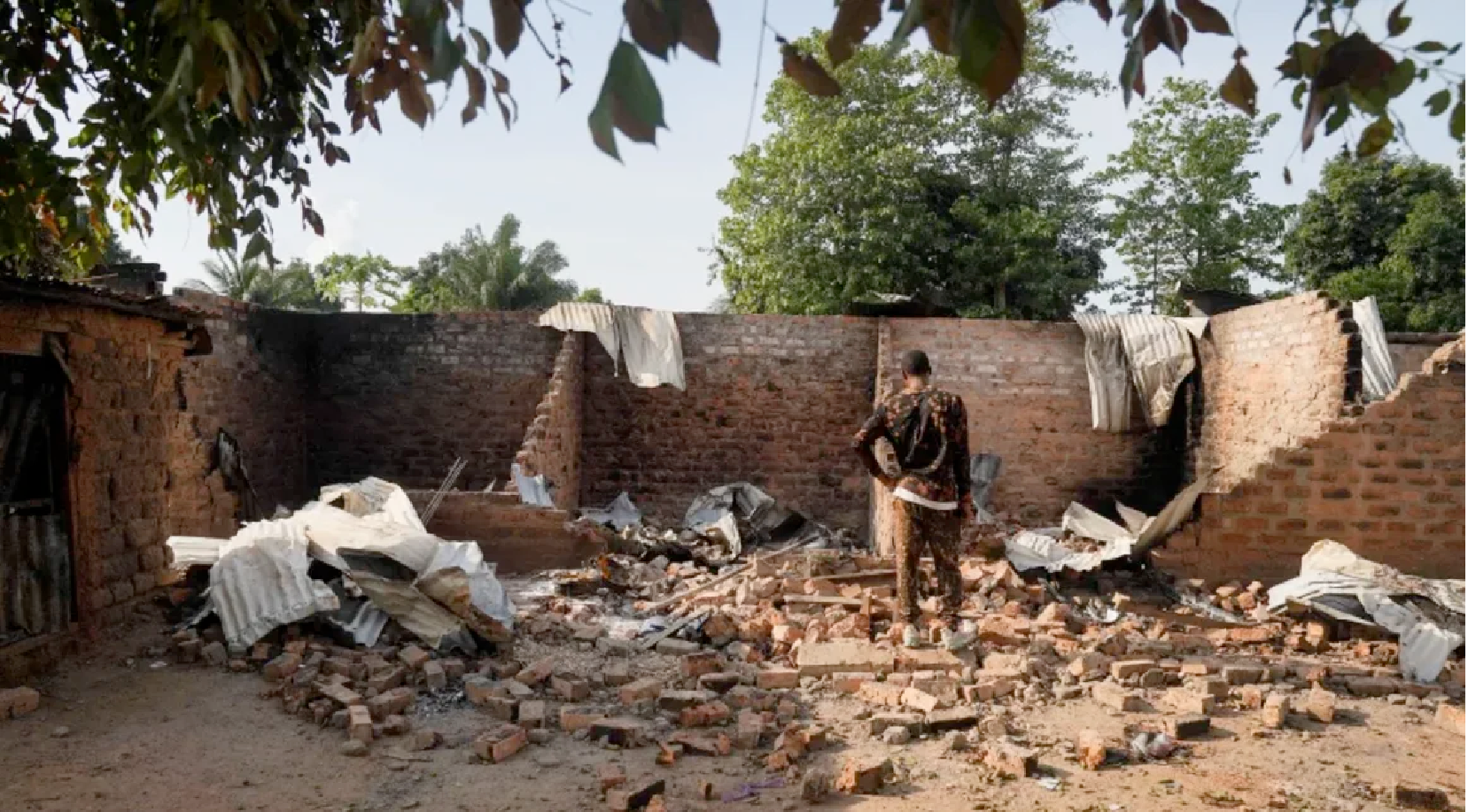Mission
A man stands in front of a damaged house after a deadly attack in Yelwata, Nigeria, on June 16. Photo: Marvellous Durowaiye/Reuters
One of the most haunting testimonies came from Christiana Joseph, who woke on the morning of the attack preparing to attend the 6 a.m. Mass. She remembers the sudden roar of engines circling her compound. Moments later, bursts of gunfire filled the air. By the time silence returned, her husband of fourteen years, John, lay lifeless on the ground. “They surrounded us,” she recounted. “It lasted only minutes, but it destroyed everything.”
(ZENIT News / Taraba, 11.20.2025).- Over three days, from the 9th to the 11th, communities in this eastern Nigerian state were struck by a wave of coordinated assaults that left as many as twenty Christians dead and entire neighborhoods in shock. Local reporters from Truth Nigeria were the first to piece together the scale of the violence, but eyewitness accounts have since revealed a scene far more terrifying than the initial figures suggest.
Residents describe bands of armed men sweeping into villages on motorcycles, converging on homes and prayer houses with unnerving precision. Survivors say the attackers moved quickly and without discrimination, firing at close range at the very structures that anchor daily life: family dwellings, parish courtyards, small chapels where children learn their prayers. The assault left behind shattered roofs, burned debris, and families wandering from house to house searching for missing relatives.
Near the Cathedral of the Holy Family, Father George Dogo has spent days alongside rescue volunteers sifting through rubble still warm from the fires. He fears the death toll will rise. “There are places we haven’t been able to clear yet,” he told local contacts. “Every hour we find someone we hadn’t accounted for.”
One of the most haunting testimonies came from Christiana Joseph, who woke on the morning of the attack preparing to attend the 6 a.m. Mass. She remembers the sudden roar of engines circling her compound. Moments later, bursts of gunfire filled the air. By the time silence returned, her husband of fourteen years, John, lay lifeless on the ground. “They surrounded us,” she recounted. “It lasted only minutes, but it destroyed everything.”
These assaults unfolded just as the United States publicly warned Nigeria that unchecked atrocities—particularly those targeting Christians—could trigger foreign intervention. Washington’s unusually sharp rhetoric highlighted what many Nigerian activists have long insisted: that violence attributed to radicalized Fulani factions has escalated dramatically, and that authorities are struggling, or unwilling, to contain it.
Among the voices consistently raising the alarm is Emeka Umeagbalasi, director of Intersociety, a human-rights organization that documents abuses and advocates for victims. He has long argued that the narrative of “local disputes” masks a pattern of targeted aggression. According to his team’s latest figures, hundreds of Christian captives—possibly up to 800—remain detained in a camp in Rijana, astonishingly close to two Nigerian military installations. “People are being held almost in sight of uniformed men,” he said. “And yet nothing changes.”
His concerns extend well beyond Taraba. He points to Enugu State, where fourteen churches—mostly Anglican, but also Catholic—have been attacked since 2021 in the Nhamufu region. Yet, he claims, officials have discouraged even calling the violence by its name. Volunteers who reported the attacks were detained, and security agencies urged them to adopt neutral language such as “community clashes” instead of “Fulani jihadist assaults.”
Umeagbalasi has repeatedly warned of what he considers a troubling dynamic: troops who remain passive while assaults unfold but arrive later to take control of the narrative. “They don’t intervene to stop the attacks,” he said. “But after the gunmen leave, they collect the bodies, seize phones, arrest residents, and accuse them of spreading falsehoods.”
Intersociety’s broader data paint a grim picture. Between January and November of this year, the organization estimates that at least 7,000 Christians have been killed in Nigeria—numbers that, if accurate, place the country among the world’s deadliest places for believers.
The Nigerian government, however, rejects any suggestion of religious persecution. At a recent press conference, Foreign Affairs Minister Yusuf Tuggar dismissed the claims as unfounded and insisted that Nigeria’s constitutional commitment to religious liberty remains intact. He went further, stating that “it is impossible” for any level of government to endorse or permit a campaign of religiously motivated violence. Officials have also argued that American concerns are based on misinterpretations, and that Abuja is cooperating with international partners while addressing internal security challenges.
But on the ground in Taraba, confidence in those assurances has eroded. The gap between official statements and lived reality feels wider than ever. For villagers who now sleep in makeshift shelters or under the protection of neighboring communities, the debate in Abuja or Washington feels distant. Their immediate worries are far simpler: recovering the missing, burying the dead, and praying that the sound of motorcycles will not return at dawn.
The November attacks have left Taraba not only grieving but questioning whether enough people—beyond its borders—are truly listening.
Thank you for reading our content. If you would like to receive ZENIT’s daily e-mail news, you can subscribe for free through this link.
View all articles
If you liked this article, support ZENIT now with a donation
To be celebrated from September 25-27, 2026 in Rome
The encounter lasted only a short while, yet it left a distinct impression—an intimate gesture at a time when the Church is preparing for one of its most significant milestones of the decade: the 800th anniversary of the death of the Poverello of Assisi, to be commemorated in 2026.
